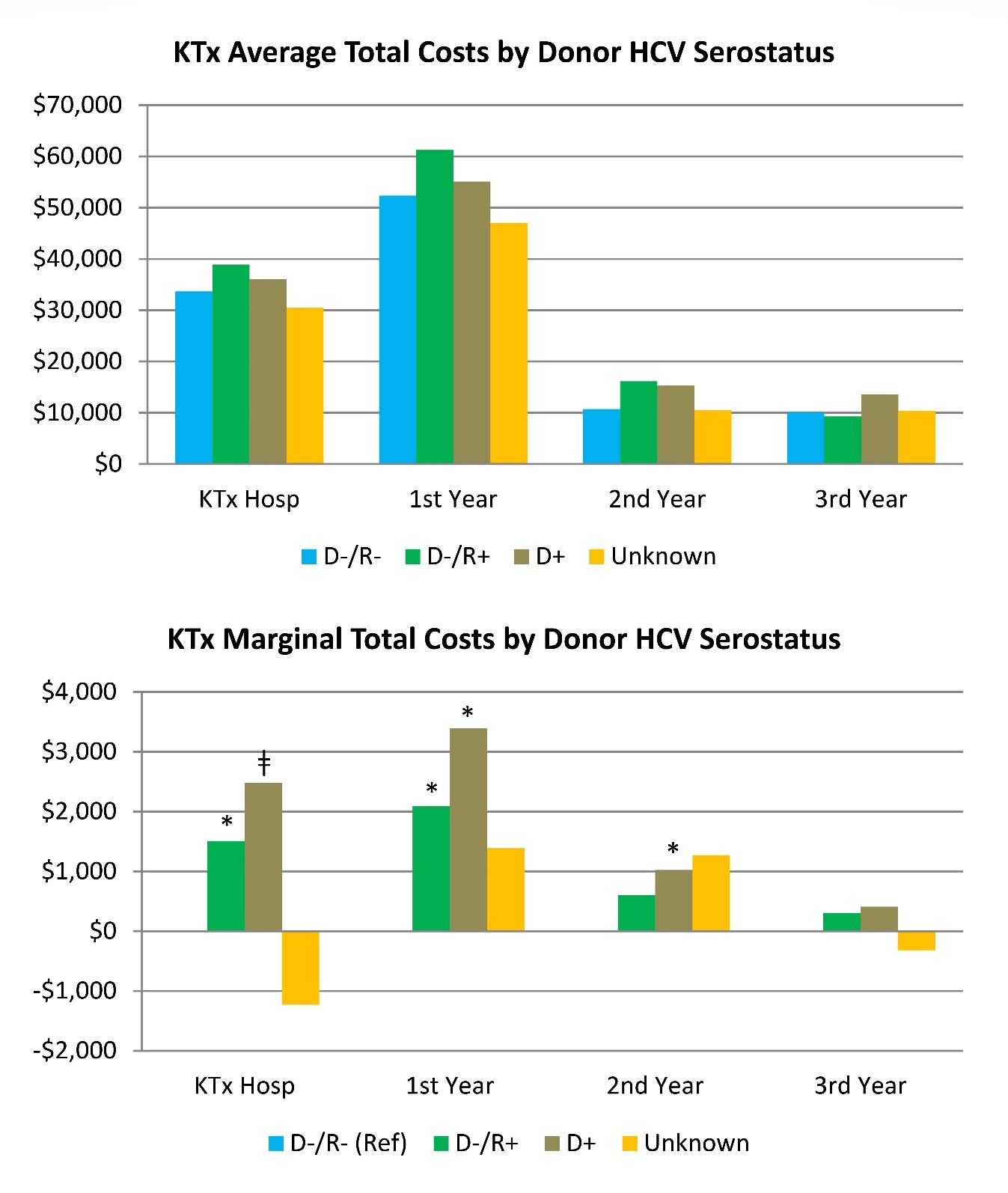Economic Impact of Donor Hepatitis C Kidney Transplantation: A Medicare Cost Analysis
1Saint Louis University Medical Center, St. Louis, MO, 2Saint Louis Univ, St. Louis, MO, 3Washington Univ, St. Louis, MO, 4SRTR, Minneapolis, MN, 5Univ of Pennsylvania, Philadelphia, PA, 6Univ of Iowa, Iowa City, IA
Meeting: 2019 American Transplant Congress
Abstract number: 473
Keywords: Economics, Hepatitis C, Kidney transplantation, Medicare
Session Information
Session Name: Concurrent Session: Non-Organ Specific: Economics & Ethics
Session Type: Concurrent Session
Date: Tuesday, June 4, 2019
Session Time: 2:30pm-4:00pm
 Presentation Time: 2:30pm-2:42pm
Presentation Time: 2:30pm-2:42pm
Location: Room 309
*Purpose: In the era of highly effective direct-acting antiviral agents (DAAs), kidney transplant (KT) from Hepatitis C virus (HCV)-positive donors is increasingly considered as an option for expanding the organ supply, including for HCV-naïve recipients. However, the economic implications of this practice are not well defined.
*Methods: This study was performed from the perspective of Medicare as payer for KT services. We examined the economic impact of donor (D) HCV serostatus using a linkage of SRTR data to Medicare Part A/B payments among Medicare-insured KT recipients (n=20,188) in the DAA era (1/1/2014-12/31/2016). Medicare payments were examined during the transplant event, from discharge to first anniversary (year 1), and in years 2 and 3 posttransplant. Marginal economic impacts were estimated by robust regression, including adjustment for other baseline donor and recipient factors captured in the registry.
*Results: Categorized by HCV serostatus, KT in the study period were 2.2% D+, 3.1% D-/R+ and 94.4% D-/R-. Mean payments for HCV D+ vs. D-/R- KT were $36,091 vs $33,677 during the transplant hospitalization. During the remainder of year 1, average Medicare payments were $55,105 vs $52,347 for HCV D+ vs D-/R- KT, respectively. After multivariate adjustment, HCV D+ KT was associated with $3387 (P=0.004) higher costs during the transplant episode, and $2478 (P<0.0001) and $1023 (P=0.03) higher adjusted Medicare expenditures in year 1 and year 2, respectively, exclusive of pharmaceutical care. By year 3, adjusted payments did not differ by donor HCV serostatus.
*Conclusions: D+ serostatus is associated with higher costs of early care after KT, independent of pharmaceuticals. Future work should examine comprehensive cost effectiveness, including benefits of reduced dialysis time, medication costs, and clinical and cost impact of more complex care.
To cite this abstract in AMA style:
Lentine K, Schnitzler M, Alhamad T, Xiao H, Randall H, Wellen J, Kasiske B, Hess G, Axelrod D. Economic Impact of Donor Hepatitis C Kidney Transplantation: A Medicare Cost Analysis [abstract]. Am J Transplant. 2019; 19 (suppl 3). https://atcmeetingabstracts.com/abstract/economic-impact-of-donor-hepatitis-c-kidney-transplantation-a-medicare-cost-analysis/. Accessed February 26, 2026.« Back to 2019 American Transplant Congress

